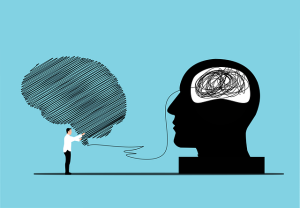Mindfulness-Based Cognitive Therapy (MBCT) is a powerful therapeutic approach integrating mindfulness practices with cognitive therapy techniques for depression prevention and management, particularly among individuals with multiple depressive episodes. It fosters present-moment awareness, emotional understanding, and challenges negative thought patterns. MBCT enables participants to develop practical strategies for managing emotions, promote self-compassion, and take an active role in their depression treatment, ultimately enhancing overall well-being. As a game-changer in depression treatment, it has shown remarkable results in preventing relapse and improving quality of life. Professional training ensures qualified therapists deliver effective MBCT within depression treatment programs.
“Unwind the cycle of depression with Mindfulness-Based Cognitive Therapy (MBCT), a revolutionary approach that combines cognitive therapy with mindfulness practices. This article delves into the transformative power of MBCT in depression treatment programs, exploring its key components and benefits. We’ll compare it with traditional CBT, guide you through everyday mindfulness techniques, and highlight success stories. Furthermore, we’ll discuss professional training, future prospects, and how MBCT offers a holistic path to managing depression.”
Understanding Mindfulness-Based Cognitive Therapy (MBCT)

Mindfulness-Based Cognitive Therapy (MBCT) is a powerful therapeutic approach that combines mindfulness practices with cognitive therapy techniques to effectively prevent depressive relapse and recurrence. It was initially developed for individuals who have experienced multiple episodes of depression, offering them a valuable tool in managing their mental health. MBCT focuses on helping individuals become more aware of their thoughts, emotions, and bodily sensations without judgment, fostering a deeper understanding of their depressive triggers.
This therapy encourages patients to pay attention to the present moment, accepting their feelings rather than fighting or suppressing them. By integrating mindfulness into cognitive therapy, MBCT enables participants to challenge negative thought patterns associated with depression. It provides practical strategies to navigate difficult emotions and promotes self-compassion, ultimately empowering individuals to take an active role in their depression treatment programs.
How MBCT Works in Depression Treatment Programs

Mindfulness-based cognitive therapy (MBCT) is a powerful tool within depression treatment programs, offering a unique approach to managing and preventing depressive episodes. It combines cognitive therapy techniques with mindfulness practices, helping individuals cultivate awareness of their thoughts and emotions without judgment. By learning to observe their mental processes, MBCT participants gain a deeper understanding of the patterns that contribute to depression.
This therapeutic method encourages active participation in the healing process. Through regular meditation exercises and mindful activities, clients develop enhanced self-awareness, emotional regulation skills, and improved coping strategies. By integrating these practices into daily life, individuals in depression treatment programs can disrupt negative thought cycles, reduce symptoms of anxiety and depression, and increase overall well-being. MBCT’s effectiveness lies in its ability to empower individuals with the tools to navigate their mental health challenges proactively and promote long-term resilience.
Key Components of an Effective MBCT Program

Mindfulness-based cognitive therapy (MBCT) is a structured program designed to help individuals manage and prevent depressive episodes. Key components contribute to its effectiveness as a depression treatment program. One of the core elements is mindfulness meditation, which involves cultivating present-moment awareness and non-judgmental acceptance. Participants learn to observe their thoughts and emotions without reacting impulsively, fostering a sense of detachment from negative thought patterns.
Additionally, cognitive restructuring plays a pivotal role in MBCT. This aspect focuses on identifying and challenging distorted thinking, replacing them with more balanced perspectives. By becoming aware of automatic negative thoughts and questioning their validity, individuals can develop healthier ways of interpreting situations, thereby reducing the risk of depressive relapses. The integration of these practices creates a comprehensive MBCT program that equips participants with valuable tools for emotional regulation and cognitive flexibility.
Benefits of Integrating Mindfulness into Cognitive Therapy

Integrating mindfulness into cognitive therapy offers a powerful approach for treating depression and enhancing overall well-being. This combination therapy leverages the benefits of both practices, providing individuals with valuable tools to navigate their thoughts and emotions more effectively. Mindfulness practices encourage present-moment awareness, helping clients observe their thoughts and feelings without judgment. This increased self-awareness can significantly reduce rumination and negative thought patterns, which are often at the core of depression.
For those participating in depression treatment programs, mindfulness-based cognitive therapy (MBCT) has shown remarkable results. By combining cognitive therapy’s structured approach with mindfulness techniques, MBCT helps individuals develop resilience against depressive episodes. It teaches practical skills to manage stress, regulate emotions, and cultivate a more positive mindset. This proactive approach not only prevents relapse but also promotes long-term mental health and improved quality of life.
Comparing MBCT with Traditional Cognitive Behavior Therapy (CBT)

Mindfulness-based cognitive therapy (MBCT) stands apart from traditional Cognitive Behavior Therapy (CBT) in its approach to treating conditions like depression. While CBT focuses primarily on changing negative thought patterns and behaviors through structured, goal-oriented sessions, MBCT incorporates mindfulness practices—such as meditation and attention training—to help individuals develop a more balanced relationship with their thoughts and emotions.
MBCT combines the cognitive restructuring of CBT with techniques designed to enhance present-moment awareness and acceptance. This dual focus allows MBCT to not only address current symptoms but also prevent relapse by equipping individuals with tools to navigate challenging situations with greater equanimity. In essence, while both approaches share common goals, MBCT offers a more holistic strategy for depression treatment programs by fostering resilience and emotional regulation through mindfulness.
Implementing Mindfulness Techniques in Everyday Life

Integrating mindfulness into daily routines offers a powerful approach for individuals seeking effective depression treatment programs. Mindfulness encourages individuals to focus on the present moment, observing their thoughts and emotions without judgment. This simple yet profound practice can be easily incorporated into everyday activities like walking, eating, or even waiting in line. By cultivating awareness of our senses, we can experience a sense of calm and clarity, helping to reduce the intensity of negative thought patterns associated with depression.
Incorporating mindfulness techniques throughout the day allows for consistent practice, fostering a deeper connection with one’s inner self. Simple breathing exercises, for instance, can be done anywhere, providing an immediate sense of grounding and relaxation. Additionally, mindful walking involves paying attention to physical sensations, surroundings, and breath, transforming a routine activity into a calming meditation. These practices not only support depression treatment but also enhance overall well-being, enabling individuals to navigate life’s challenges with greater resilience.
Professional Training and Certification for MBCT Therapists

Professional training and certification are essential components in ensuring effective Mindfulness-based Cognitive Therapy (MBCT) for depression treatment programs. Therapists undergo specialized education to master this evidence-based approach, which combines mindfulness practices with cognitive therapy techniques. This rigorous training equips practitioners with the skills to guide clients through mindful awareness, acceptance, and cognitive restructuring, helping them manage depressive symptoms and prevent relapse.
Certified MBCT therapists typically complete advanced coursework, workshops, and supervision hours to meet professional standards. These qualifications assure individuals seeking depression treatment that they are working with experts who have demonstrated proficiency in delivering MBCT. Such certification programs play a vital role in upholding quality care and fostering the growth of MBCT as an effective intervention for depressive disorders.
Real-Life Success Stories: MBCT in Action

In real-life settings, Mindfulness-based Cognitive Therapy (MBCT) has proven to be a powerful tool in combating depression. Many individuals have found success and lasting relief through this innovative approach. MBCT combines mindfulness practices with cognitive therapy techniques, offering a unique way to manage and prevent depressive episodes. By learning to recognize and challenge negative thought patterns, individuals gain valuable coping skills that enhance their overall well-being.
Success stories from depression treatment programs incorporating MBCT highlight its effectiveness. Participants often report improved emotional regulation, increased resilience against stress, and better sleep quality. These positive changes contribute to a higher quality of life, allowing individuals to regain control and find purpose. Such testimonials underscore the potential of MBCT as a game-changer in depression treatment, providing individuals with practical tools to navigate their mental health journey effectively.
Exploring Future Directions for Depression Treatment with MBCT

Mindfulness-based cognitive therapy (MBCT) has emerged as a promising approach in the realm of depression treatment, offering novel perspectives and potential future directions. By combining cognitive-behavioral techniques with mindfulness practices, MBCT provides individuals with valuable tools to manage depressive symptoms and prevent relapse. This hybrid therapy has shown significant effectiveness in reducing recurrence rates, making it an attractive option within depression treatment programs.
Future research and clinical applications may explore the integration of MBCT with other therapeutic modalities, such as interpersonal psychotherapy or psychodynamic approaches, to create comprehensive and tailored depression treatment programs. Additionally, advancements in technology could facilitate the accessibility and scalability of MBCT interventions, reaching a broader spectrum of individuals seeking effective depression treatment.
